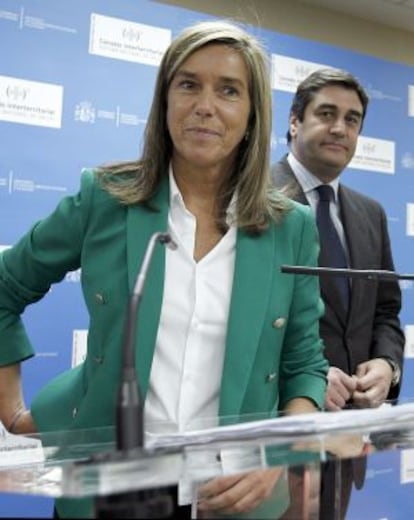Passing on a debt to society: seniors to be charged for their medicines
Pensioners will have to pay up to 18 euros per month under new plan

Spanish pensioners, who currently do not have to pay for prescription medicines, will be obliged to contribute 10 percent toward them under new Health Ministry guidelines designed to slash seven billion euros from the state’s expenditure on public healthcare. The subsidy will be capped at eight euros per month for retired citizens with income of less than 18,000 euros per year and 18 euros for those that exceed that figure.
Active workers will continue to pay 40 percent toward prescriptions if they fall into the former earnings bracket and 50 percent in the case of the latter. People who earn more than 100,000 euros a year will pay up to 60 percent.
Exactly how this graded system of charges will be implemented remains unclear.
Health Minister Ana Mato announced the measure on Wednesday following a meeting of regional health chiefs. Other cost-cutting proposals put forward by the minister include changes to the law to “put a stop to health tourism and the abuses carried out by foreigners who travel to Spain to benefit from the health system.” The Immigration Law will also be modified to ensure that non-Spanish nationals who use the public health system live and work in the country.
Mato also stated that measures would be taken to reduce pharmaceutical costs in general and to bring down the cost of medicines, while urging the sector to try to ensure “there are no more pills in medicine boxes than necessary.” A central purchasing center for prescription drugs is also to be set up “as we did with the influenza vaccinations, which allowed us to save six million euros.” The proposal is set to be approved in Congress on Friday.
It is estimated there are eight million pensioners in Spain that will be affected by the new regulation. “More than four million pensions are below the minimum wage and an extra expense for these people, however small it may seem, will prevent them from meeting other payments,” said Luis Martín Pindado, president of the Democratic Union of Pensioners of Spain.
“It seems like a little, but you have to bear in mind that people of this age take many treatments. It is not ridiculous to think that many pensioners will stop paying other costs, like electricity and water, if they have extra expenditures. The government said it was not going to touch pensions — well this is touching them because having to pay for medicine, something we had consolidated, will reduce pensions.”
María Jesús Montero, the acting regional health chief of Andalusia opined that the government’s measures were the “waiting room for the dismantling of the national health system.” Montero noted the government’s use of terms such as “public assurance” and “public insurer.”
“The language is not innocent,” she said. “[The health service] is not a public insurer but a national health system that is paid for with the contributions of the citizens and which allows the redistribution of income in terms of health to the collective citizenry.”
Tu suscripción se está usando en otro dispositivo
¿Quieres añadir otro usuario a tu suscripción?
Si continúas leyendo en este dispositivo, no se podrá leer en el otro.
FlechaTu suscripción se está usando en otro dispositivo y solo puedes acceder a EL PAÍS desde un dispositivo a la vez.
Si quieres compartir tu cuenta, cambia tu suscripción a la modalidad Premium, así podrás añadir otro usuario. Cada uno accederá con su propia cuenta de email, lo que os permitirá personalizar vuestra experiencia en EL PAÍS.
¿Tienes una suscripción de empresa? Accede aquí para contratar más cuentas.
En el caso de no saber quién está usando tu cuenta, te recomendamos cambiar tu contraseña aquí.
Si decides continuar compartiendo tu cuenta, este mensaje se mostrará en tu dispositivo y en el de la otra persona que está usando tu cuenta de forma indefinida, afectando a tu experiencia de lectura. Puedes consultar aquí los términos y condiciones de la suscripción digital.








































